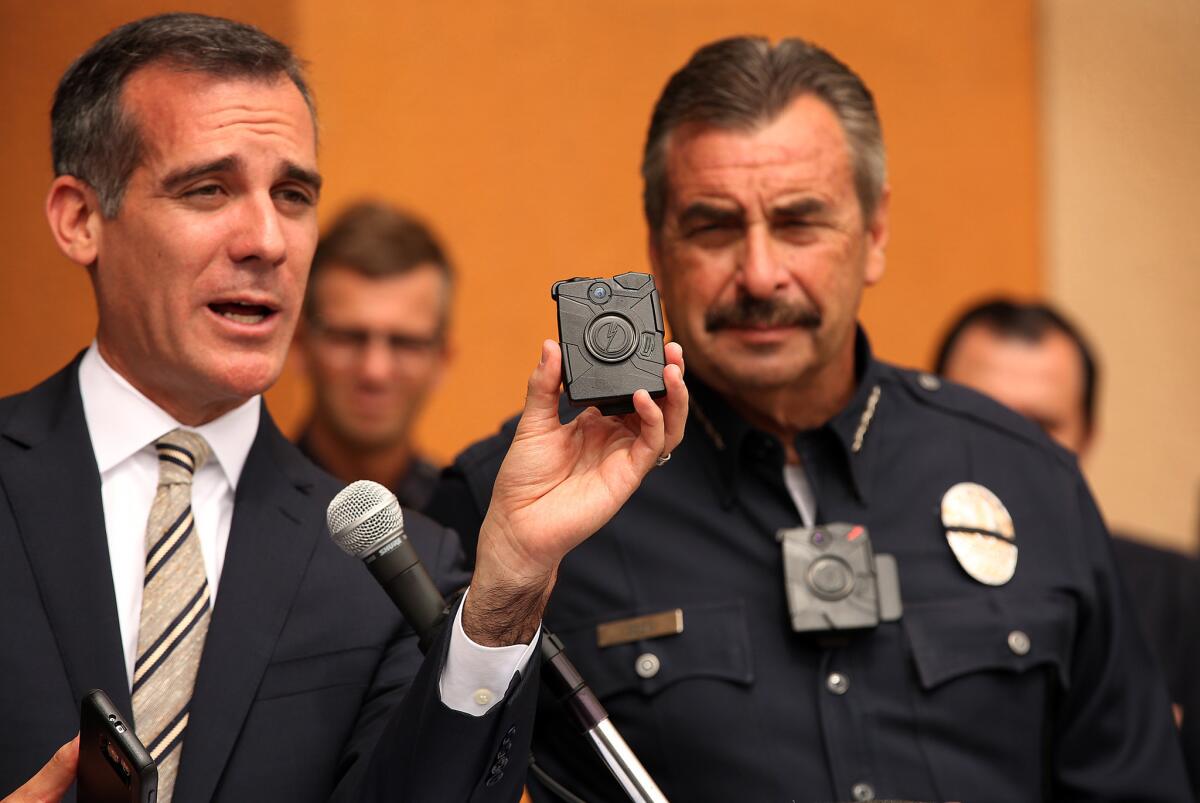Who gets to see police body camera footage? State lawmakers may decide this year

L.A. Mayor Eric Garcetti and LAPD Chief Charlie Beck demonstrate the department’s new body cameras in 2015.
- Share via
Reporting from Sacramento — With police departments across California continuing to equip their officers with body cameras, state lawmakers are trying again to set rules for their use, including one of the thorniest policy issues: who gets to see the footage and when.
The debate will force legislators to weigh deep transparency and privacy concerns that don’t have clear ideological answers, as is evidenced in the details that have emerged from two competing bills within the Democratic caucus.
Assemblyman Bill Quirk (D-Hayward) wants to ensure that body camera footage, especially in high-profile cases, would be released as soon as two months after the incident occurred -- a big change from current practice which provides no guarantee any footage would ever come to light.
Quirk said his bill is motivated by the circumstances surrounding the release of video footage depicting the police killing of Chicago teenager Laquan McDonald. McDonald was killed in October 2014, but Chicago police didn’t release the video until after intense public pressure 13 months later. The officer involved was charged with murder in the hours after the video’s posting.
“I don’t want that to happen in California,” Quirk said in an interview.
Though Quirk’s bill would probably speed up public release of video recorded by an officer’s body camera, a bill from his Democratic colleague, Assemblyman Jim Cooper of Elk Grove, calls for a slower approach. Cooper’s proposed legislation emphasizes a ban on releasing body camera footage while criminal and civil cases are ongoing.
Cooper, a former captain in the Sacramento County Sheriff’s Department, was on a legislative trip to Australia and unavailable for comment. Cooper’s public safety aide Mike Ziegler said body camera footage is evidence that should be protected.
“I can’t think of one type of evidence that is routinely released for public review prior to the adjudication of a criminal or civil case,” Ziegler said.
Cooper’s bill would allow for the release of body camera footage only with a court order.
Many large police departments in California, including Los Angeles, San Diego and Oakland, already equip at least some of their officers with body cameras. Generally departments restrict all public access to the footage outside of a courtroom or police review panels that include citizens, though Oakland had made some videos public through records requests.
Last year, multiple body camera bills failed in the Legislature as lawmakers couldn’t reach agreement on broad standards for their use amid heavy pressure from law enforcement. The most prominent effort came from Assemblywoman Shirley Weber (D-San Diego), who decided to withdraw her bill rather than amend it so that police officers could review camera footage before writing their reports. Cooper’s new bill also would give officers the ability to see body camera footage of incidents before filing reports.
Weber had planned to revisit body camera legislation this year, but has decided to defer to her colleagues’ bills, according to her spokesman.
Public disclosure of body camera footage varies widely across the country. Seattle’s police department has posted redacted versions of its videos on a YouTube channel and has released footage of police-involved shootings almost immediately after they occurred. By contrast, state lawmakers in South Carolina decided last year to keep all police body camera videos under wraps.
Twelve states and Washington, D.C., have passed laws regulating public access to police body camera footage and another two dozen have legislation pending, according to a tally from the nonprofit Reporters Committee For Freedom of the Press. Most of the states that have passed laws have restricted access to the footage beyond what their public records laws would otherwise allow, an attorney for the nonprofit said.
Quirk, who plans to continue revising his bill, said one reason the majority of legislative efforts have failed in California is that the technology is so new his colleagues aren’t sure how to handle its implications. State lawmakers, he said, are still learning about it.
“Frankly, I don’t know if any of the bills, including mine, will be [able to pass] this year,” Quirk said.
Twitter: @dillonliam
ALSO:
LAPD report defends ambitious plan to outfit officers with body cameras
California lawmakers return to the Capitol to tackle leftover business
More to Read
Get the L.A. Times Politics newsletter
Deeply reported insights into legislation, politics and policy from Sacramento, Washington and beyond. In your inbox twice per week.
You may occasionally receive promotional content from the Los Angeles Times.











